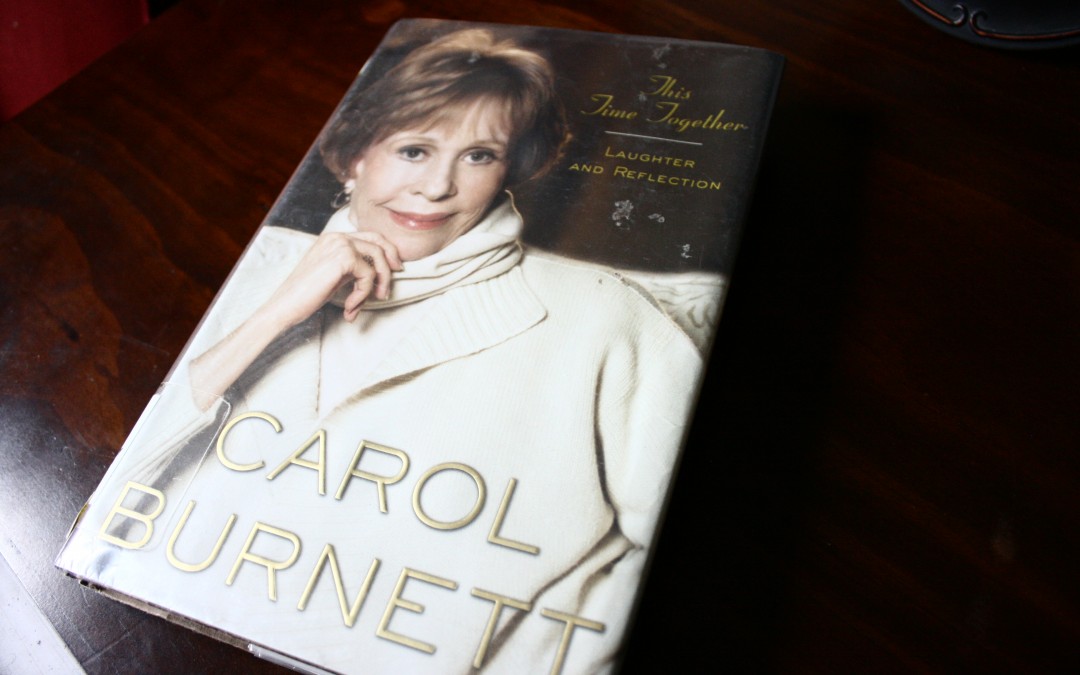I’ve mentioned before that I really enjoy reading humor books. Some of my favorite humor writers include Erma Bombeck, Jim Gaffigan and Dave Barry. I recently read Carol Burnett’s memoir This Time Together, which wasn’t a straight-up humor book but was more a record of her rise to fame.
Burnett was part of a comedy troupe back before I was born, and she had a fascinating life. Sometimes, when comedians write their memoirs, they drop a lot of names or talk about things that lose readers if they’re not familiar with the shows they’re talking about, but even though Burnett was before my time, I found that This Time Together was not hard to follow.
This Time Together was the story of how Burnett got started in comedy and what it was like once she did. She and her kid sister grew up with their grandmother, and she launched out on her own when a wealthy friend gave her some money with the stipulation that when she made it famous, she would have to pay him back.
Burnett was a self-made woman, which I admire about her. It was fascinating to read the words of such a remarkable woman who made a name for herself during a time when women weren’t considered all that funny. She had some great stories about people she met along the way, her family, and other comedy legends who existed around that time.
One of the things I loved most about the book was that Burnett never made fun of another colleague but only told stories that they would have approved of, whether they were living or dead. I really respected that about her (not a lot of comedians or comediennes can stop themselves from the temptation of Making Fun of Other Colleagues). It couldn’t have been easy fighting for a place in a man’s world, and Burnett did it on her own merit—not only with integrity but also with class.
One of the lines I liked best in the book was this one:
“I have always believed there is something more to this world than just us. I remember being four years old and lying on the grass in the backyard in San Antonio looking up at that clouds. I don’t know how much time passed before I felt my body merging with the sky and the ground. I was everything, and everything was me.”
It shares a depth of Burnett that isn’t often seen when one is writing and performing humor; so I liked seeing another side of her personality—that wondering imagination of a child that resonates with the truth of humanity.
Burnett shares all sorts of funny stories, from something her daughter did at a restaurant, to her and Julie Andrews embarrassing themselves in front of Lady Bird Johnson—and what I loved about her humor was that it was humor from real life. There’s so much humor around us if we have on the right kind of eyes. Burnett draws that out. It was clear that Burnett finds humor in her everyday experiences—not by making fun of other people but by seeing the irony and the satire in her own life—which helps readers do the same in their own lives.
Interspersed with the humorous stories, Burnett sprinkled in serious parts that made me cry. It was by turns funny and emotional. She ended the book on a serious note, with a story about her daughter, Carrie, who had introduced the plan to turn Burnett’s first memoir into a play. The memoir was written about Burnett’s mother and father and her grandmother. Burnett and her daughter worked on it together, but in the middle of the project, Carrie was diagnosed with lung cancer and died before the play, which ended up winning a Tony Award, even debuted. The last section, written in such a raw way, made me cry, of course (big feelings). Carol, faced with finishing the project without her daughter, did not even want to get out of bed, she said, but then her husband told her she owed it to her daughter to finish the play and make sure it got produced. And so she did.
All in all, This Time Together was a great read, and I’ll probably go back and read all of Burnett’s other memoirs, because I enjoyed her style of writing. Her chapters were short, which makes a reader feel like they’re making significant progress even though they’ve only really read three pages. “Well, I finished a chapter,” I’d say, before the kids would come knocking on my door, trying to find me. “Now I feel accomplished.”
So you’ll laugh, you’ll feel inspired, and, if you’re like me, you’ll also cry—which is exactly what a book should make you do.


